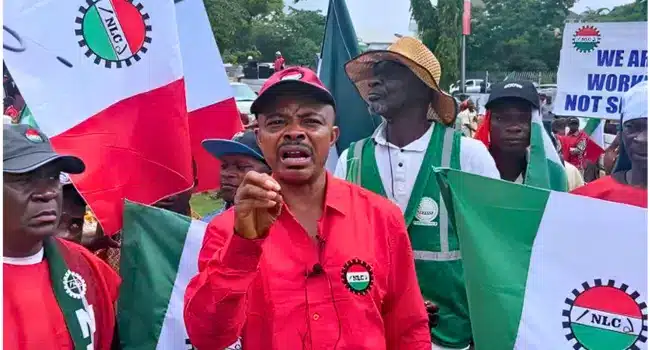
The clamour for a wage review beyond the newly implemented national minimum wage of ₦70,000 is gaining momentum within Nigeria’s labour movement, driven largely by the relentless surge in inflation.
During the 2024 May Day celebration, the Presidents of the Nigeria Labour Congress (NLC) and the Trade Union Congress (TUC), Comrades Joe Ajaero and Festus Osifo, jointly emphasized the urgency of addressing the economic realities facing Nigerian workers. In a post-event interview, Ajaero gave a deeper insight into Labour’s next course of action — a push for a Cost of Living Allowance (COLA).
According to Ajaero, the current minimum wage agreement was accepted under protest after failed attempts to tie wage increases to inflation. “We had hoped the government would present a well-prepared plan tied to the actual cost of living. We asked basic questions — how much will go to transport, housing, food? They had no answers,” he said.
He revealed that Labour reluctantly accepted the ₦70,000 figure following a presidential assurance that fuel prices would remain unchanged. “Unfortunately, they reneged. Inflation has since eroded the value of the new wage, and even the temporary wage award has stopped,” he added.
Ajaero argued that a COLA is now necessary to mitigate the biting economic hardship. “It’s not about whether it’s right or wrong anymore — it’s about survival. Some states can’t even pay wages despite receiving increased allocations from subsidy removal savings.”
He also criticized the perceived inaction of state governors, stating that funds saved from subsidy removal were being mismanaged at subnational levels. “The President himself admitted that the money now goes to the governors, but what are they doing with it?”
Reclaiming Civic Space Amid Hardship
On the theme of this year’s May Day, “Reclaiming the Civic Space in the Midst of Economic Hardship,” Ajaero said it was a reflection of both the economic and political climate. He lamented growing suppression of protests and civic expression, drawing historical parallels to the resistance during the Structural Adjustment Programme (SAP) era under General Ibrahim Babangida.
“Even market women now analyze the dollar rate. Prices change daily, and Nigerians are suffering. When we cry out, we’re met with threats and suppression. That’s not democracy,” he said.
Ajaero recalled how students and workers united against SAP policies in the 1980s and noted that today’s situation mirrors that period. “History has shown that when economic policies are harsh, people will rise. That’s how the 1929 Aba Women’s Protest began — economic resistance.”
He warned that as long as inflation continues to rise and economic pressure mounts on workers, Labour will continue to demand more than just a minimum wage — they will fight for fairness, relief, and democratic space to express the people’s suffering.

Comments